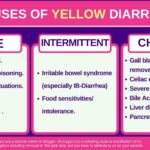Indigestion & Diarrhea: 9 Common Causes (Acute & Chronic).
Our content is not intended nor recommended as a substitute for medical advice by your doctor. Use for informational purposes only.
Indigestion and diarrhea can be acute, as with acute gastroenteritis, food poisoning, or a faulty diet. Also, Indigestion and diarrhea can be chronic with irritable bowel syndrome, gallbladder conditions, food intolerance, etc.
The table below summarizes the different causes of Indigestion and diarrhea based on the time frame.
Acute Indigestion & diarrhea. | Chronic Indigestion & diarrhea |
| 1. Acute gastroenteritis. | 1. Food intolerance or allergy. |
| 2. Faulty diet. | 2. Irritable bowel syndrome. |
| 3. Recent intake of certain medications. | 3. Gallbladder conditions (such as gallstones, gallbladder removal). |
| 4. Anxiety and stress attacks. | 4. Chronic pancreatitis. |
| 5. Celiac disease. | |
| 6. Chronic gut infections. | |
| 7. Small intestinal Overgrowth | |
| 8. Others such as IBD, pancreatitis, endocrinal diseases, etc. |
Acute Indigestion and diarrhea:
1 . Acute gastroenteritis.
The recent onset of severe watery diarrhea, stomach upset, and Indigestion is commonly due to gastrointestinal tract infections. The most common cause of infection is viral gastroenteritis (stomach flu).
Viral gastroenteritis or stomach flu starts as sudden onset of diarrhea, abdominal pain, Indigestion, nausea, and vomiting.
Causes of acute gastroenteritis:
- Viral gastroenteritis (commonest): such as norovirus, rotavirus, etc.
- Bacterial gastroenteritis (most severe) includes E. Coli, Shigella, etc.
- Protozoal infections such as amoebiasis and giardiasis.
Symptoms of acute gastroenteritis include:
- Acute onset abdominal pain or discomfort.
- Acute onset diarrhea (usually watery and yellowish).
- Nausea and maybe vomiting.
- Indigestion (dyspepsia).
- Fever (often very mild or low-grade). However, bacterial gastroenteritis may cause high-grade fever.
- Body aches and fatigue.
- Headaches.
- Anorexia (loss of appetite).
- The symptoms of acute viral gastroenteritis typically last for one to 3 days and then resolve spontaneously.
Learn More about acute viral gastroenteritis.
2. Faulty diet.
An occasional attack of Indigestion and diarrhea can result from what you’ve eaten.
Eating excess foods famous for causing gut upset may cause an attack of Indigestion or diarrhea (or loose stool) and Indigestion).
Examples include:
- A large fatty meal.
- Drinking too much alcohol.
- Drinking too much coffee or any caffeinated drink.
- Very spicy foods.
- Too much fructose (eating large amounts of fruits such as bananas, apples, etc.).
- Eating too many fried foods.
Eating any of the above foods in moderation usually doesn’t cause Indigestion and diarrhea. However, the symptoms appear when you overeat any of them (especially fatty foods).
The attack of Indigestion and diarrhea is often short and self-limiting. No other abnormal symptoms (such as severe abdominal pain, persistent diarrhea, vomiting, or fever) are present.
No specific treatment for such a condition. Indigestion and diarrhea improve when you stop faulty diet habits.
3. Recent medications.
When you suddenly suffer from Indigestion, loose stool, or diarrhea, you must check any recent medication intake.
Many medications may cause dyspepsia, heartburn, and diarrhea.
Common examples include:
- Non-steroidal anti-inflammatory medications such as Ibuprofen, Ketorolac, etc.
- Too much laxative intake (particularly osmotic laxatives such as lactulose and Miralax.
- Antibiotics such as azithromycin, amoxicillin, etc.
- Theophyllines.
4. Anxiety and stress attacks.
Anxiety and stress significantly affect the function of your digestive system.
Many functional diseases of the gut are linked to stress and anxiety, such as:
- Irritable bowel syndrome.
- Functional dyspepsia.
- Functional abdominal pain.
- Functional heartburn.
Due to any situation or life event, acute stress may induce temporary Indigestion, diarrhea, or loose stool.
With stress, your body releases hormones and chemicals that affect the motility and the function of your digestive system production system.
Eventually, the symptoms resolve when anxiety goes away. But with continuous stress, some may develop functional gut diseases such as irritable bowel syndrome.
Chronic/recurrent Indigestion and diarrhea:
1. Irritable bowel syndrome.
Irritable bowel syndrome affects about 15% of people worldwide (reference). It is a functional bowel disease that can cause recurrent diarrhea, abdominal pain, and Indigestion.
Dyspepsia (Indigestion) is very common in patients with IBS. One study found that about 87% of patients with IBS have Indigestion (dyspepsia).
The cause of IBS is not clear. However, it may be related to anxiety and stress.
With IBS, there is no specific lesion or impairment in your digestive tract; That’s why it is called (a functional disease).
No test or imaging technique is specific for IBS. Instead, it is diagnosed based on your symptoms’ pattern and duration.
The ROME IV criteria are doctors’ most common symptom-based criteria to diagnose IBS.
Interestingly, most people who meet IBS criteria don’t know that they have IBS and don’t seek medical advice.
So, strongly consider IBS to cause your recurrent Indigestion and diarrhea.
Symptoms of IBS:
- Recurrent abdominal pain or discomfort (at least one day per week for three months).
- Defecation often relieves Abdominal pain or Indigestion (partially or completely).
- In a small subset of people, The pain may exacerbate after defecation.
- The onset of pain is often associated with changes in bowel habits (diarrhea, constipation, or alternating diarrhea and constipation.
- Constant indigesiton (dyspepsia).
- Bloating (very common).
You cannot diagnose yourself with IBS. You need to consult your doctor if you think Indigestion and diarrhea are IBS-related.
Learn More: How is IBS diagnosed?
2. Food intolerance.
Food intolerance is another widespread and underdiagnosed condition responsible for many cases of recurrent Indigestion and diarrhea.
For example, lactose intolerance (found in milk and dairy products) affects about 65%.
Food intolerance occurs when your body cannot properly digest some foods or food constituents. It is often due to a digestive enzyme’s partial or complete absence.
Common offending foods include:
- Milk and dairy products.
- Caffeine.
- Fructose: is found in most fruits and honey.
- Salicylates: present in a wide range of fruits, vegetables, food perspectives, and some medications.
- FODMAPs (a collection of foods that contains highly fermentable sugars, including lactose, fructose, artificial sweeteners, etc. Learn more.
The symptoms of food intolerance include:
- Bloating and Indigestion.
- Nausea and vomiting.
- Diarrhea.
- Flatulence.
- Abdominal pain.
- The symptoms depend on the amount you eat of the offending food. The more you eat, the more symptoms you get.
So, recurrent or chronic Indigestion and diarrhea can be a symptom of food intolerance, such as lactose intolerance.
Try to notice any association between your symptoms and the food you consume. Keeping a food diary may also help.
Learn more about food intolerances.
3. Gallbladder conditions.
The gallbladder stores and secretes bile which helps the digestion of fat and fat-soluble vitamins.
Disease or removal of the gallbladder can cause chronic Indigestion and diarrhea.
The two most common examples are:
- Gallstone disease: gallstones inside the gallbladder cause recurrent abdominal pain, dyspepsia (indigestion), and maybe attacks of diarrhea.
- Post-cholecystectomy diarrhea (secondary bile acid diarrhea): about 20% of people may suffer from diarrhea that may last months or years after the gallbladder surgery. The condition is often associated with dyspepsia or Indigestion. Learn more.
4. Chronic medications.
Many chronic medications may cause both Indigestion and diarrhea. Review your list of chronic medications for any of the following:
- Metformin (a famous anti-diabetes medicine).
- Nonsteroidal anti-inflammatory medications such as aspirin, ibuprofen, or naproxen.
- Lipid-lowering medications such as atorvastatin and simvastatin.
- Some heart and blood pressure medications include ACE inhibitors and Calcium channel blockers.
- Colchicine.
- Chemotherapy drugs.
- And other. Learn More HERE and HERE.
5. Celiac disease.
Celiac disease affects about 1% of people (reference). With celiac disease, the intestine becomes extremely allergic to a protein called (gluten) found in wheat, rye, and barley.
Eating gluten produces diffuse damage to the lining of the small intestine. As a result, your digestive system becomes unable to absorb essential nutrients.
On the other hand, the accumulated food causes digestive symptoms such as Indigestion, diarrhea, and abdominal pain.
Symptoms:
- Chronic diarrhea.
- Excess gas, bloating, and Indigestion.
- Nausea and sometimes vomiting.
- Easy fatigue, shortness of breath (due to anemia).
- Weight loss.
- Unhealthy skin (scaly, loss of hair, rashes).
- Chronic fatigue.
- Lack of concentration.
- Chronic headache.
- Chronic abdominal pain.
Celiac disease is diagnosed via specific blood tests and endoscopy. The definitive treatment for celiac disease is a gluten-free diet.
6. SIBO (small intestinal bacterial overgrowth).
SIBO, or small intestinal bacterial overgrowth, is when excessive bacteria colonize the small intestine.
The normal bacterial inhabitants of the small intestine increase in number and interfere with the digestion and absorption of nutrients.
SIBO is an underdiagnosed condition. We still don’t know the exact prevalence of the disease. However, it is common among people with IBS.
Symptoms of SIBO:
- Bloating is the most common symptom.
- Indigestion.
- Flatulence.
- Chronic abdominal discomfort.
- Chronic watery diarrhea.
- In severe cases, fatty or greasy diarrhea and malabsorption may occur.
- Weight loss.
- Symptoms of malabsorption, such as anemia, fatigue, and lower limb swelling, may also occur.
7. Others.
- IBD.
- Chronic infections of the gut as chronic giardiasis, typhoid fever, etc.
- Pancreatitis.
- Endocrinal diseases include hyperthyroidism, carcinoid tumors, VIPoma, gastrinoma, etc.
- Female hormonal fluctuations such as premenstrual syndrome.
- Functional dyspepsia (the commonest cause of Indigestion but rarely causes diarrhea).
- Evidence-based
- Written by a doctor.

Related Posts:
- Unexplained Diarrhea & No Other Symptoms: 9 Common Causes.
- Can you Die from Acute Pancreatitis: 6 Facts & Statistics.
- 17+ Tasty High-Fiber Lunch Ideas For Chronic Constipation
- Yellow Watery Stool: Common Causes And Treatments.
- Large Black Spots In Stool: Common Causes & When To Worry
- Why do I always have diarrhea?






